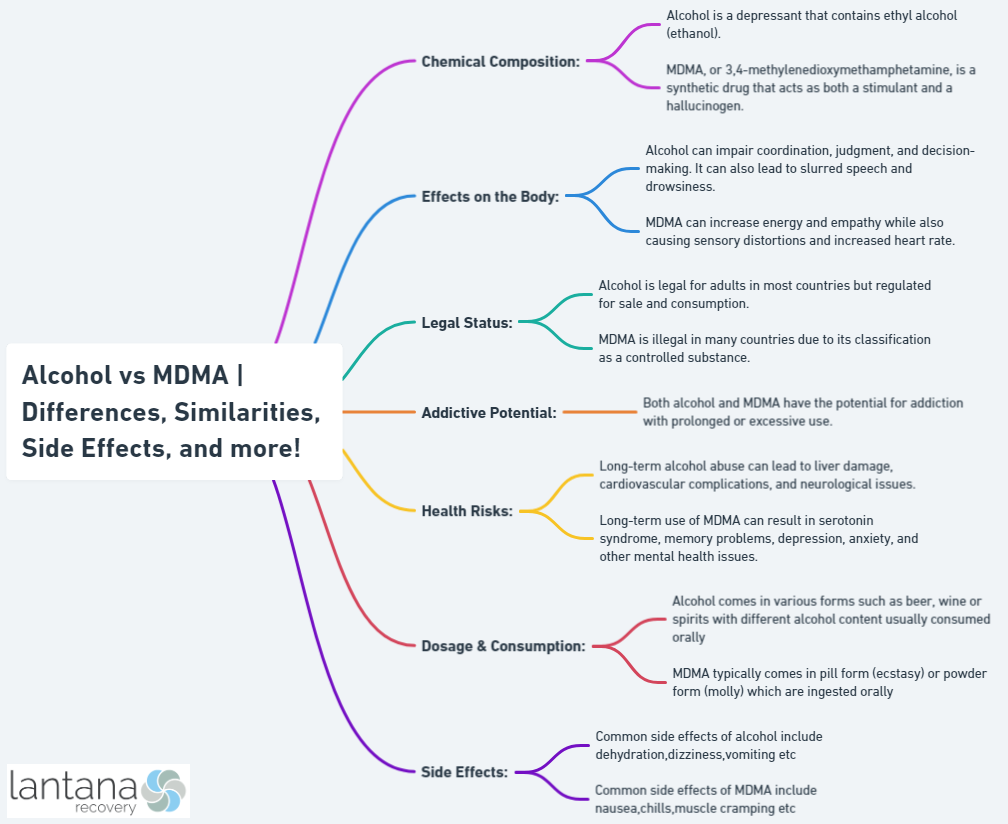Alcohol and MDMA (also known as ecstasy or Molly) are two popular recreational substances that are often used at parties, clubs, and other social events. Both substances have a reputation for causing feelings of euphoria, increased sociability, and reduced inhibitions.
However, despite their similarities, there are also significant differences between the two substances in terms of their effects on the body and mind. In this article, we will explore the differences and similarities between alcohol and MDMA, including the side effects and risks associated with each substance, as well as the potential long-term effects of use.
So let’s get started!
What is Alcohol?
Alcohol, also known as ethyl alcohol or ethanol, is a psychoactive substance that is found in a wide variety of beverages, including beer, wine, and spirits. It is a central nervous system depressant, which means that it slows down the activity of the brain and body.
When consumed, alcohol is rapidly absorbed into the bloodstream, and its effects can be felt within minutes. The effects of alcohol depend on the dosage and the individual’s tolerance, but generally, it causes feelings of relaxation, euphoria, and sociability at lower doses.
There are, however, many dangers associated with misusing or abusing alcohol, including addiction, liver damage, and depression.
Chemical Composition of Alcohol
The chemical composition of alcohol is C2H6O.
What is MDMA?
MDMA (3,4-methylenedioxy-methamphetamine) is a psychoactive drug that is known for its ability to produce feelings of euphoria, increased energy, and emotional warmth. It is often referred to as “ecstasy” or “molly” on the street. MDMA is usually consumed in pill or powder form and it’s often associated with the club or party scene.
It is a stimulant that increases the activity of certain neurotransmitters in the brain, particularly serotonin, which is responsible for regulating mood, emotions, and social behavior.

Chemical Composition of MDMA
Chemically it is composed of a methylenedioxy ring, made up of two oxygen atoms joined together, and a methoxy group. The chemical formula for MDMA is C11H15NO2.
Alcohol vs. MDMA: Fact Sheet
|
Alcohol |
MDMA |
|
| Generic Name | Alcohol | Molly, Ecstasy |
| Drug Type | CNS Depressant | Stimulant |
| Active Ingredients | Ethanol | 3,4-methylenedioxy-methamphetamine |
| Used as treatment for: | Killing germs | None |
| Available Form(s) | Liquid | Pills |
| Available Strengths | 200 mg, 250 mg, 300 mg | |
| Is it a controlled substance? | No | Yes |
| Legal Status | Unscheduled | Schedule I |
| Risk of Withdrawal Effects | Yes | Yes |
| Risk of Addiction | Yes | Very low |
MDMA Dosage and Side Effects:
The typical recreational dose of MDMA is between 75-150 mg, taken orally. It is important to note that the effects of MDMA can vary widely depending on the individual, the dosage, and the method of use. Additionally, MDMA is a Schedule I controlled substance in the United States, and its possession, sale, and use are illegal.
Moreover, frequent use of MDMA can cause a number of negative side effects on our bodies. These can include
- Increased heart rate and blood pressure: MDMA can cause the heart to pump harder, which can put a strain on the cardiovascular system and increase the risk of heart attack or stroke.
- Nausea and vomiting: Some people may experience digestive inconvenience after taking MDMA.
- Muscle tension: MDMA can cause muscle tension and jaw clenching, which can be uncomfortable or even painful.
- Increased body temperature: MDMA can cause the body to overheat, which can lead to dehydration, hyperthermia, and in rare cases, organ failure.
- Anxiety and paranoia: MDMA can cause feelings of anxiety and paranoia, which can be distressing.
- Insomnia: Some people may find it difficult to sleep after taking MDMA as it is a CNS stimulant.
- Depression and anxiety: Prolonged use of MDMA can lead to depression and anxiety.
It’s important to remember that the MDMA sold on the street may contain other substances or contaminants, which can lead to dangerous or even fatal consequences. It’s also crucial to note that the use of MDMA is illegal in most countries.
Alcohol Dosage and Side Effects:

Alcohol is categorized as a CNS depressant, which implies that it slows down both body and brain activity, leading to a feeling of relaxation and calm. It is possible for alcohol’s effects to vary depending on a person’s tolerance and the amount consumed.
Some of the most often reported adverse consequences of excessive alcohol use include lightheadedness, nausea, vomiting, blurred vision, decreased coordination, and compromised judgment.
However, in extreme situations of intoxication, alcohol use can lead to respiratory depression, and organ failure caused by high levels of ethanol concentration in the bloodstream.
Alcohol abuse can cause long-term health problems such as scarring of the liver or alcohol poisoning. Plus, it can also result in psychological problems like depression and anxiety. However, by drinking alcohol moderately, one can reduce the risk of developing these health issues. Men can only consume a maximum of four drinks in a single day or 14 drinks per week, while women can only consume a maximum of three drinks in a single day or seven drinks per week, according to the Centers for Disease Control and Prevention (CDC).
For the majority of healthy adults, drinking alcohol is widely regarded as safe at these suggested levels. It is possible to experience adverse reactions if excessive amounts of alcohol are consumed regularly or all at once.
MDMA vs. Alcohol: Can You Withdrawal for Either?

Yes, withdrawal is possible for both MDMA and alcohol. Withdrawal from MDMA can cause symptoms such as depression, anxiety, insomnia, fatigue, and irritability. These symptoms can last for several days to a few weeks, and in some cases, they can be severe and difficult to manage.
Withdrawal from alcohol can cause symptoms such as tremors, insomnia, anxiety, depression, and in severe cases, seizures or delirium tremens (DTs). The symptoms of alcohol withdrawal can be severe and can last for several days to a few weeks.
It’s important to note that the severity of withdrawal symptoms will depend on several factors, including the individual’s level of physical dependence, the duration of use, and the dosage. It’s important to seek professional help to manage withdrawal symptoms, as they can be severe and difficult to manage on your own.
Medically assisted treatment, therapy, and support groups can be effective in helping individuals quit and recover from substance use disorder.
Alcohol vs MDMA: Prevalence in the United States
According to the 2020 National Survey on Drug Use and Health (NSDUH), an estimated 139.7 million people aged 12 or older (52.5%) reported using alcohol at least once in their life.
The same report estimates that 14.5 million people aged 12 or older (5.4%) had an alcohol use disorder in the past year. In 2019, an estimated 15,957 deaths occurred in the United States due to alcohol-induced causes, excluding accidents and homicides.
According to the Centers for Disease Control and Prevention (CDC), more than 140,000 individuals die in America each year due to alcohol overdose. In 2019, alcohol was involved in 29% of motor vehicle deaths in the United States.
According to the NIAAA, alcohol use disorder (AUD) is more common in men than women and is highest in adults ages 18–29. More importantly, AUD also increases polydrug use in teens and young adults, such as mixing alcohol with heroin, MDMA, opioids, etc.
The NSUDH 2020 drug report suggests that more than 2.6 million people reported taking MDMA (Ecstasy) in the past 12 months. Since then, these numbers have been rising due to the increased use of drugs in mainstream media, leading to more young individuals taking MDMA.
Bottom Line: Alcohol versus MDMA
Both alcohol and MDMA have been around for centuries with humans finding ways to utilize these substances for pleasure or medical reasons alike. However, it’s important to understand their differences since they can have serious consequences when misused or abused over time leading to addiction or even death in extreme cases.
It is important that individuals understand the risks associated with each substance before making any decisions regarding their usage so that they can make informed choices regarding their health and well-being moving forward. With understanding comes responsibility, so make sure you know what you’re getting yourself into before trying either substance out!
FAQs on MDMA and Alcohol
Can alcohol increase the risk of cancer?
Yes, some studies have proved that alcohol can increase the risk of breast cancer in women and colon cancer in men.
Can we use Ketamine for treating alcohol addiction?
Ketamine has been found to reduce cravings and decrease the risk of relapse in people with alcohol abuse disorder and heroin addiction.
Which is more addictive: Alcohol vs MDMA?
Both alcohol and MDMA have the potential to be addictive, but alcohol is considered to be more addictive than MDMA.





